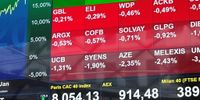On Wednesday, April 2, 2025, Belgium’s stock market closed lower, with the BEL 20 index declining by 0.50%. This downturn was largely attributed to losses in the telecommunications, basic materials, and healthcare sectors, which propelled shares downward. The index ended the day at 4,344.17 points, reflecting a cautious market sentiment ahead of significant announcements from the United States.
The biggest gainers on the BEL 20 were Ackermans & Van Haaren NV (EBR:ACKB), which saw a rise of 0.99% or 2.00 points, closing at 204.00. Groep Brussel Lambert NV (EBR:GBLB) also performed well, adding 0.71% or 0.50 points to finish at 70.80. Azelis Corporate Services NV (EBR:AZE) was up 0.67% or 0.11 points, closing at 16.55. Despite these gains, the overall trend was negative, as falling stocks outnumbered advancing ones by 63 to 32, with 12 stocks ending unchanged on the Brussels Stock Exchange.
Among the biggest losers, Solvay SA (EBR:SOLB) fell 2.95% or 0.98 points, closing at 32.26. Sofina (EBR:SOF) declined 2.71% or 6.60 points to end at 236.60, while Cofinimmo SA (EBR:COFB) was down 2.39% or 1.45 points, trading at 59.30. The market's overall decline reflected broader concerns about economic stability and the potential impact of upcoming trade policy changes from the U.S.
In commodities trading, gold futures for June delivery increased by 0.72% or 22.56, reaching $3,168.56 per troy ounce. Meanwhile, crude oil prices also saw a modest rise, with May delivery crude oil up 0.39% or 0.28, hitting $71.48 per barrel. The June Brent oil contract rose 0.24% or 0.18, trading at $74.67 per barrel. These increases in commodity prices suggest a slight recovery in investor confidence, despite the overall market decline.
The euro was slightly stronger against the dollar, with the EUR/USD rising 0.47% to 1.09, while the EUR/GBP remained unchanged at 0.84. The U.S. Dollar Index Futures fell by 0.51% to 103.42, indicating a weaker dollar amidst the fluctuating market conditions.
Market analysts noted that the day’s trading was overshadowed by anticipation of a press conference from U.S. President Donald Trump, who was set to unveil details regarding new American trade policies. This announcement has been dubbed 'Liberation Day' by Trump, and it has generated considerable speculation among traders. According to a trader at KBC, "Trump has kept the market in extreme tension with what he calls 'the Big One.'" The uncertainty surrounding the potential new import tariffs has left many investors anxious.
Reports suggest that the new tariffs could surpass previous measures significantly, with various proposals being discussed, including a tiered tariff system with fixed rates of 10% or 20% for all countries. The idea of reciprocal tariffs, where other nations would pay the same rates as U.S. imports, is also on the table. As KBC Economics noted, "The intention is to make other countries pay the same as what the U.S. has to pay." The lack of clarity about which countries would be targeted and whether tariffs would take immediate effect or allow for negotiations has further complicated the market outlook.
On the macroeconomic front, several important figures were released on the same day. U.S. factory orders in February showed a slight increase, rising more than expected. Additionally, the ADP jobs report indicated a rise in private sector jobs by 155,000 in February, significantly higher than the previous month’s increase of 84,000. These figures could influence market sentiment as investors digest the implications of the upcoming trade policy changes.
Despite the overall market decline, some individual stocks showed resilience. AB InBev managed to gain 0.1%, buoyed by a buy recommendation from Berenberg. However, the bank pointed out that Heineken remains the sector favorite. D’Ieteren also saw a rise of 0.6% after Exane BNP Paribas initiated coverage with a buy rating and a price target of 230 euros.
On the other hand, pharmaceutical companies faced pressure, with UCB and Argenx dropping 0.6% and 1.3%, respectively. Analysts predict that these companies could face significant U.S. import tariffs. Sofina and Solvay were among the biggest losers, each seeing declines of nearly 3%.
Barco stood out with a remarkable gain of over 6.1%, following an upgrade from ING, which set a target price of 17.00 euros. Berenberg had already raised its target to 16.00 euros, reflecting positive market sentiment towards Barco.
In corporate news, Ontex completed the sale of its Brazilian operations to Softys, while Ekopak announced a delay in revenue recognition for its Waterpower project, prompting KBC Securities to revise its advice and price target for the stock. Ekopak’s share price plummeted by 36.1%, reflecting investor concerns about the company’s future performance.
Avantium also faced significant losses, with a decrease of nearly 18% after announcing a capital increase of 40 million euros to support the rollout of its bioplastics product. The market reaction highlights the challenges faced by companies in securing funding amidst uncertain economic conditions.
As the day concluded, the S&P 500 index in the U.S. gained 0.2%, while the technology-heavy Nasdaq rose by 0.4%, indicating a mixed response from investors globally. The developments in Belgium’s stock market reflect a broader concern about economic stability and the potential impact of trade policies on various sectors.




